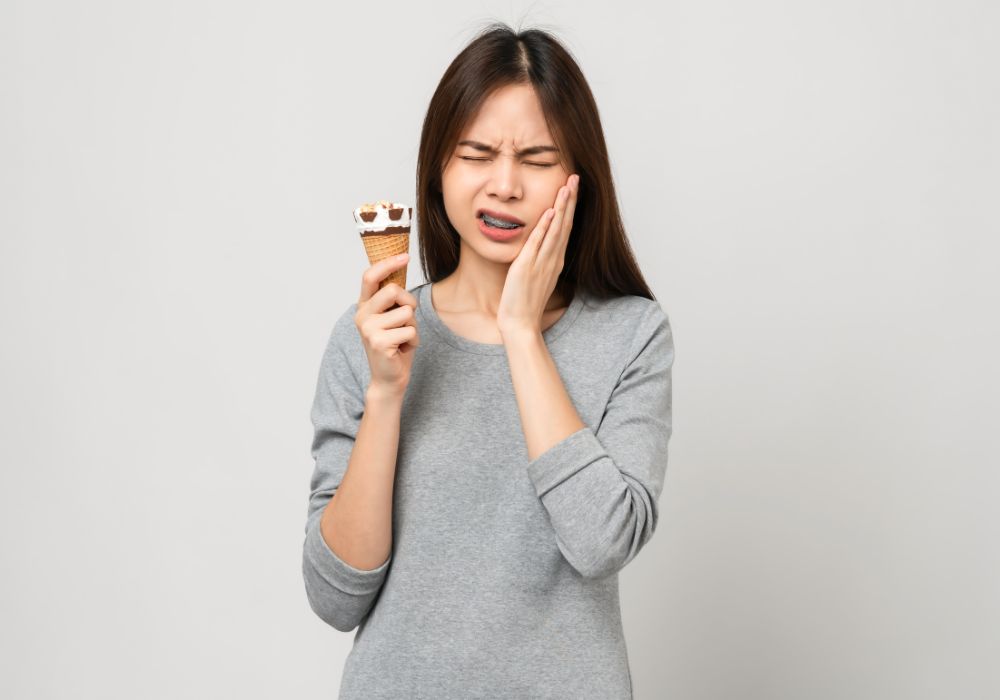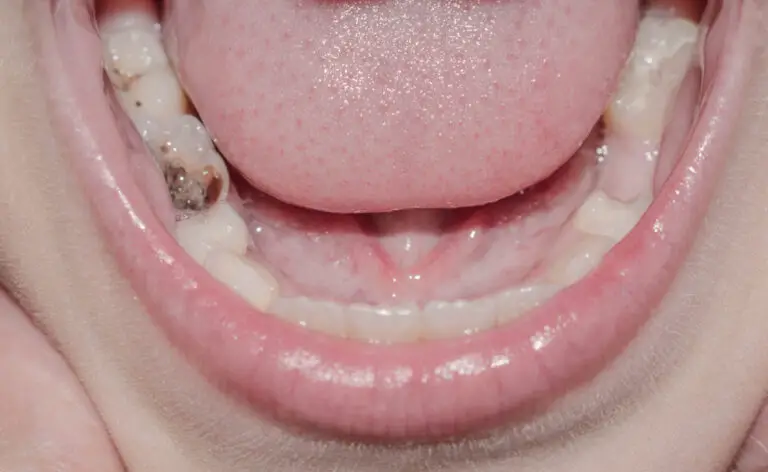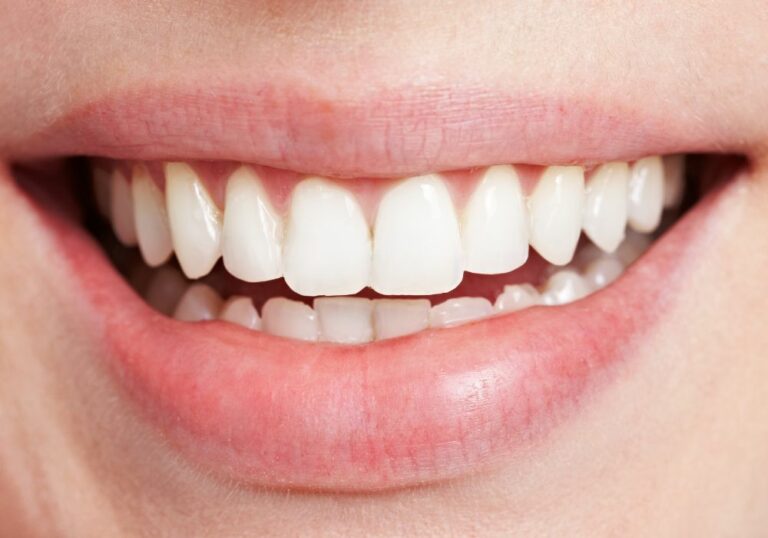Tooth sensitivity, also known clinically as dentin hypersensitivity, is a common dental condition estimated to affect nearly 57% of adult populations worldwide. It occurs when the dentin layer underlying the outer enamel layer becomes exposed, resulting in sharp pains when encountering thermal, evaporative, tactile, osmotic or chemical stimuli. Fortunately, tooth sensitivity can often be treated and cured through natural remedies right at home.
What is dentin hypersensitivity?

Dentin hypersensitivity is characterized by short, sharp pains arising from exposed dentin surfaces in response to external stimuli. This happens when the dentin tubules are opened and the fluid inside them moves slightly, which in turn activates nerve signaling from microscopic pulp fibers located at the center of each tooth. These irritated nerves send pain signals to the brain, even though there is no real damage to the tooth itself.
The condition usually involves the facial and cervical surfaces of teeth near the gum line. The sharp, shooting pain sensations frequently affect the canines and premolars of both upper and lower arches. Dentin hypersensitivity often occurs after eating, drinking, brushing or rinsing if products are highly acidic, hot, cold or sugary. Respiration like breathing cold air through the mouth can also trigger discomfort.
Causes and risk factors for tooth sensitivity
There are several potential causes and risk factors involved in the development of dentin hypersensitivity:
Gum recession
Gingival recession refers to gum tissue pulling away from the tooth, progressively exposing root surfaces and dentin. This appears as a notch in the gum line and can affect one tooth or multiple teeth simultaneously. Gum recession is most frequently seen in patients over age 40 but can occur at any age.
Aggressive tooth brushing, inadequate oral hygiene leading to periodontal disease, hormonal changes, smoking, genetics, orthodontic treatment, and facial/jaw developmental abnormalities all increase susceptibility to receding gums. As more cementum and dentin get exposed, teeth become increasingly sensitive. Advanced gum recession may eventually lead to loose teeth and tooth loss altogether.
Loss of enamel
Tooth enamel is the hard, outer mineralized surface that protects the softer dentin underneath. But enamel can become worn and eroded from acidic foods, improper brushing, teeth grinding, genetics and aging. This allows dentin to become exposed, resulting in pain from hot or cold foods and air.
Enamel erosion and thinning is also seen in bulimics and people with chronic acid reflux due to recurrent vomiting and regurgitation of stomach acids. Conditions like acidosis and hypocalcemia also increase the risk of enamel defects.
Dental procedures
Certain dental treatments can heighten tooth sensitivity by irritating and inflaming nerves in the pulpal region underneath. This includes professional tooth whitening, dental bonding, removal of decay, tooth restoration and replacement, root planing and scaling, crown preparation, orthodontic treatment, and apicoectomy.
Post-treatment sensitivity is usually temporary lasting a few days to several weeks as the nerves heal and adjust. However, procedures that remove enamel can lead to chronic sensitivity if dentin remains uncovered.
Tooth cracks
Cracks, fractures and micro-fractures in the enamel and dentin leave teeth susceptible to sensitivity. This is because small gaps and crevices allow penetration of hot, cold, sweet and acidic substances deep inside the tooth where nerves are located. Clenching, grinding, trauma, improper biting and heavy occlusal forces are common culprits. The pain is usually localized to the defective area.
Bruxism
Habitual teeth grinding and clenching, also called bruxism, puts repetitive strain on teeth that can cause enamel to wear away. This eventually exposes the softer dentin material to irritation. People with severe bruxism often have multiple sensitive, flattened, fractured or loose teeth. Stress and sleep disorders are major contributing factors.
Trigeminal neuralgia
This chronic neurological disorder affects the trigeminal nerve carrying sensation from the face to the brain. It causes episodes of intense, stabbing or electric shock-like facial pain. Teeth sometimes become overly sensitive as a result of the damaged nerve fibers.
Natural home remedies for tooth sensitivity

If you suffer from dentin hypersensitivity, try these proven natural remedies to find relief:
1. Use desensitizing toothpaste
Desensitizing toothpastes contain active ingredients that help relieve pain by sealing or blocking exposed dentinal tubules. This prevents fluid shifts and nerve transmission.
- Potassium nitrate helps numb and depolarize nerve endings.
- Stannous fluoride or oxalate work by depositing a protective barrier over areas of exposed dentin.
- Strontium chloride adheres deep inside the tubules to inhibit fluid movement and sensitivity.
- Arginine and calcium carbonate contain compounds that seal off tubules.
Brush twice daily with a pea-sized amount of desensitizing toothpaste using soft, circular motions. Desensitizing effects become more pronounced after 3-4 weeks of continued use. Popular brands include Sensodyne, Colgate Sensitivity Pro-Relief, Crest Sensi Stop, and many more.
2. Use fluoride rinse
Fluoride has well-known enamel-strengthening properties. Swishing a fluoride mouthrinse around the teeth and gums for 60 seconds twice per day can also reduce dentin hypersensitivity. It works by binding to enamel, dentin, fillings and crowns to form a protective barrier that minimizes sensitivity. Prescription rinses often contain higher concentrations of fluoride than over-the-counter options.
3. Apply desensitizing gel, paste or cream
Desensitizing gels, pastes and creams provide targeted relief by sealing off exposed dentinal tubules, often more powerfully than toothpastes. They typically contain fast-acting ingredients like 5% potassium nitrate, fluoride, hydroxyapatite, or casein phosphopeptide-amorphous calcium phosphate (CPP-ACP).
Apply a pea-sized amount directly on sensitive areas as needed, especially after brushing, flossing or eating acidic foods. Many options are available including Sensodyne Rapid Relief, Colgate Sensitive Pro-Relief desensitizing paste, Squigle Sensodyne Tooth Builder Gel and MI Paste.
4. Obtain fluoride treatments
Getting periodic professional fluoride treatments is an excellent way to strengthen enamel and prevent sensitivity long-term. The American Dental Association recommends treatments every 3, 6 or 12 months depending on your specific risk factors.
There are several types of fluoride treatments:
- Gel or foam administered in trays that you bite down on for 4 minutes.
- Varnish painted directly on teeth that absorbs minerals for several hours.
- Antimicrobial fluoride rinses to help prevent cavities and decay.
The concentrated fluoride ions penetrate deep inside exposed dentinal tubules to block sensitivity. Treatments may need to be repeated regularly to keep sensitivity at bay.
5. Switch to soft or ultrasoft toothbrush
A soft-bristled toothbrush is less likely to abrade enamel or damage gums than a hard one. This helps prevent worsening of sensitivity. Look for “soft”, “extra soft” or “ultra soft” on the label when selecting a new toothbrush. Electric toothbrushes with rotating heads are also more gentle on teeth.
Use a light touch when brushing and avoid vigorous back-and-forth motions. Be sure to replace your toothbrush every 3-4 months or sooner if bristles become splayed and ineffective.
6. Drink more water
Staying hydrated is crucial for good oral health and saliva flow. Saliva naturally washes away food debris and acid, shields teeth from bacteria and facilitates mineral redeposition. Aim to drink at least half your body weight in ounces of water per day. Swishing cool water around the mouth soothes sensitive teeth instantly.
7. Limit consumption of acidic foods
Frequent exposure to acidic foods and drinks erodes tooth enamel over time. As enamel layer thins, dentin underneath gets irritated more easily, resulting in hypersensitivity. Limit intake of acidic foods like:
- Citrus fruits, juices (orange, grapefruit, lemon, lime)
- Tomatoes, ketchup
- Vinegar, vinaigrettes
- Wine, carbonated drinks, sports drinks
- Coffee, tea (unless decaffeinated)
- Sour candy, yogurt
Rinse with plain water after consuming any acidic food or beverage. This dilutes and clears away erosive agents. Waiting at least 30 minutes before brushing also allows enamel to reharden.
8. Avoid teeth whitening and bleaching products
Products containing peroxides and other harsh abrasives can make teeth excessively sensitive during and after bleaching. Stop usage if sensitivity occurs. Also avoid highly abrasive tooth-whitening toothpastes as they can damage enamel. Ask your dentist about alternative whitening options.
9. Wear a nightguard if you grind teeth
Custom nightguards prevent wearing down of enamel from chronic teeth grinding and clenching (bruxism) while sleeping. Have your dentist make an impression of your teeth to fabricate a tight-fitting, comfortable mouthguard that you can wear at night. Reduce stress and avoid alcohol, caffeine or tobacco several hours before bedtime as these exacerbate bruxism.
10. Try natural home remedies
For quick relief, you can try dabbing sensitive areas with soothing ingredients like:
- Aloe vera gel – Contains anti-inflammatory agents
- Baking soda – Alkalizes acidic areas
- Coconut oil – Forms protective coating
- Ice cubes – Numb nerve endings
- Milk of magnesia – Seals dentinal tubules
- Green tea bags – Contains tannins that constrict nerves
- Cucumber slices – Refreshing anti-inflammatory
Rinse with plain water afterwards since leaving these ingredients on the teeth can damage enamel over time.
Professional dentist treatments

While home remedies can temporarily alleviate sensitivity, visiting a dentist is crucial for resolving the underlying problem through targeted professional treatments.
Dental bonding
Bonding resins applied over areas of exposed dentin act as a barrier against stimuli. The materials match the color of your natural teeth for a seamless look. But bonding can wear off over time and may need replacing every few years.
Sealants
Dental sealants are thin coatings painted onto the chewing surfaces of back teeth to protect dentin from decay. They are also effective at sealing off dentinal tubules and insulating nerves. Sealants last 5-10 years but need monitoring.
Fluoride varnish
Fluoride varnish concentrates fluoride right where it’s needed most to remineralize enamel and block sensitivity. It adheres strongly to teeth and releases fluoride for several hours after application. Treatments take just a few minutes and results improve with periodic application.
Tooth restoration
Dental fillings, inlays, onlays and crowns physically cover exposed dentin to instantly end sensitivity. They also require removal of decayed material and shaping of the tooth involved. Good oral hygiene is needed to prevent recurrent decay underneath restorations.
Gum grafts
Gum grafting surgery can cover exposed root surfaces in cases of advanced gum recession. A piece of soft tissue is taken from the palate or another site and used to build up shrinking gum tissue. This protects underlying dentin and stops related sensitivity.
Root coverage procedures
Root coverage procedures like pinhole surgical technique or connective tissue graft also aim to regenerate shrinking gum tissue over exposed roots. This reduces pockets around teeth that serve as bacterial reservoirs leading to gum disease and accelerated recession.
Occlusal adjustment
Selectively contouring biting surfaces of teeth can eliminate discomfort from excessive pressures during chewing. This helps prevent fracture and movement that might lead to dentin exposure and subsequent sensitivity.
Nerve treatments
If sensitivity is due to inflamed or damaged nerves, a root canal or extraction may be necessary. Apicoectomy can also be done to remove the root apex and surrounding irritated nerve tissue.
Tips for preventing tooth sensitivity
Good oral care and smart dietary and lifestyle habits can help prevent or minimize tooth sensitivity:
- Maintain a thorough but gentle brushing and flossing routine using soft or ultrasoft bristles and proper technique
- Use desensitizing toothpaste and mouthwash daily
- Rinse with water after consuming acidic foods and drinks
- Limit intake of acidic, sugary, carbonated, or excessively hot or cold foods/drinks
- Drink plenty of plain water each day to promote saliva flow
- Get dental work done as soon as any issues arise
- Wear a mouthguard at night to avoid enamel damage from teeth grinding/clenching
- Quit smoking and other tobacco products to avoid gum recession and oral cancer
- Get professional teeth cleanings and exams every 6 months
When to see a dentist
Consult your dentist promptly if you experience:
- Sudden or severe tooth sensitivity not alleviated by over-the-counter remedies
- Sensitivity accompanied by dental pain, swelling or other symptoms
- Sensitivity persisting longer than 4 weeks
- Recession of the gums
- Visible cracks, fractures, cavities or defects in teeth
- Discoloration at the gum line indicating possible decay
- Difficulty eating or drinking hot or cold foods
- Known or suspected pregnancy as hormones affect oral tissues
The dentist can properly diagnose the underlying cause and provide appropriate treatment tailored to your needs. Left untreated, many sources of sensitivity progressively worsen causing permanent damage.
Frequently asked questions
1. Why are my teeth suddenly sensitive to cold?
Sudden sensitivity to cold could indicate a fractured tooth, gum recession exposing dentin, enamel wear, cavity, or dying nerve. Cracked teeth show sharp pain when encountering cold air or food. Visible defects, chips, notches and brown spots also signify underlying issues. See your dentist to determine the cause.
2. Can sensitive teeth be cured permanently?
If the cause is treated, sensitivity can potentially be cured permanently. Sealing exposed tubules with resin, crowns or fillings provides lasting relief. Gum grafting over receded roots also helps long-term. But some people have chronic sensitivity requiring ongoing management like desensitizing toothpaste.
3. What toothpaste is best for sensitive teeth?
Look for active ingredients like stannous fluoride, potassium nitrate, arginine, strontium chloride or CPP-ACP when selecting a desensitizing toothpaste. Use twice daily per directions. Sensodyne, Colgate, Crest and Tom’s of Maine make effective, gentle options. Ask your dentist for a recommendation based on your needs.
4. Can sinus problems or allergies cause tooth sensitivity?
Sinus infections, allergies, colds and nasal congestion can sometimes radiate tooth pain or exacerbate underlying sensitivity. This referred pain occurs due to the close proximity of sinus cavities to upper back teeth. Treating the respiratory condition typically eliminates tooth discomfort. But other dental causes should also be evaluated.
5. Is sensitive toothpaste safe to swallow?
Sensitive toothpastes are safe if a small amount is swallowed inadvertently. But intentionally ingesting toothpaste can cause stomach upset due to high fluoride content. Keep tubes out of children’s reach and supervise brushing. Contact Poison Control if a large amount is swallowed. Discontinue use if any reactions occur and switch brands.







